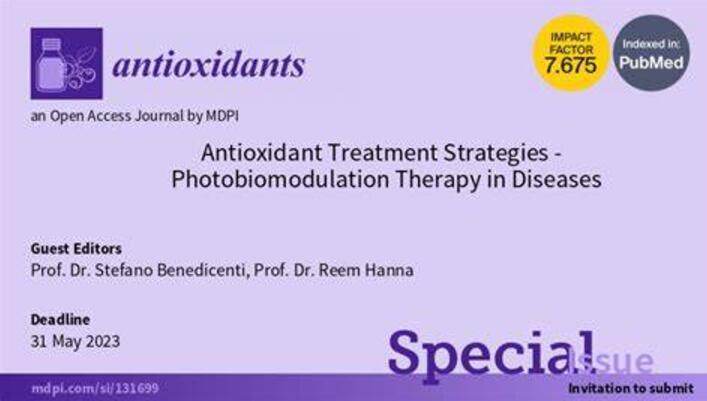The Effects of Maca (Lepidium meyenii Walp) on Cellular Oxidative Stress: A Systematic Review and Meta-Analysis
IF 6
2区 医学
Q1 BIOCHEMISTRY & MOLECULAR BIOLOGY
引用次数: 0
Abstract
Lepidium meyenii Walp (LmW) or Maca, including its bioactive components such as macamides, among others, has demonstrated antioxidant effects. However, the effect size (ES) of LmW on oxidative stress has not been qualitatively described and calculated. The primary objective of this systematic review and meta-analysis was to review and qualitatively describe the studies published up to 2023 that supplemented LmW to control cellular oxidative stress; the secondary objective was to calculate the ES of the different interventions. The search was designed following the PRISMA® guidelines for systematic reviews and meta-analyses and performed in the Web of Science, Scopus, SPORTDiscus, PubMed, and MEDLINE until 2023. The selection of studies included randomized controlled trials, with tests and post-tests, both in vitro and in vivo in animals and humans. The methodological quality and risk of bias were evaluated with the CAMARADES tool. The main variables were reduced glutathione, glutathione peroxidase, superoxide dismutase, and malondialdehyde. The analysis was conducted with a pooled standardized mean difference (SMD) through Hedges’ g test (95% CI). Eleven studies were included in the systematic review and eight in the meta-analysis. They revealed a small effect for reduced glutathione (SMD = 0.89), a large effect for glutathione peroxidase (SMD = 0.96), a moderate effect for superoxide dismutase (SMD = 0.68), and a moderate effect for malondialdehyde (SMD = −0.53). According to the results, the phytochemical compounds of LmW effectively controlled cellular oxidative stress, mainly macamides. It was also determined that a higher dose of LmW generated a greater antioxidant effect. However, information concerning humans is scarce.玛卡(Lepidium meyenii Walp)对细胞氧化应激的影响:系统回顾与元分析
Lepidium meyenii Walp(LmW)或玛咖(Maca),包括其生物活性成分,如玛咖酰胺等,都具有抗氧化作用。然而,LmW 对氧化应激的效应大小(ES)尚未得到定性描述和计算。本系统综述和荟萃分析的主要目的是综述和定性描述截至 2023 年发表的有关补充 LmW 以控制细胞氧化应激的研究;次要目的是计算不同干预措施的 ES。检索的设计遵循了系统综述和荟萃分析的 PRISMA® 指南,并在 Web of Science、Scopus、SPORTDiscus、PubMed 和 MEDLINE 上进行了检索,检索时间截止到 2023 年。所选研究包括随机对照试验、测试和后测,包括动物和人体的体外和体内试验。采用 CAMARADES 工具对研究方法的质量和偏倚风险进行了评估。主要变量为还原型谷胱甘肽、谷胱甘肽过氧化物酶、超氧化物歧化酶和丙二醛。通过赫奇斯 g 检验(95% CI)对标准化均值差异(SMD)进行了汇总分析。有 11 项研究被纳入系统综述,8 项研究被纳入荟萃分析。研究显示,还原型谷胱甘肽的影响较小(SMD = 0.89),谷胱甘肽过氧化物酶的影响较大(SMD = 0.96),超氧化物歧化酶的影响中等(SMD = 0.68),丙二醛的影响中等(SMD = -0.53)。结果表明,LmW 的植物化学物质能有效控制细胞氧化应激,主要是金刚酰胺。研究还发现,较高剂量的 LmW 能产生更大的抗氧化效果。然而,有关人类的资料却很少。
本文章由计算机程序翻译,如有差异,请以英文原文为准。
求助全文
约1分钟内获得全文
求助全文
来源期刊

Antioxidants
Biochemistry, Genetics and Molecular Biology-Physiology
CiteScore
10.60
自引率
11.40%
发文量
2123
审稿时长
16.3 days
期刊介绍:
Antioxidants (ISSN 2076-3921), provides an advanced forum for studies related to the science and technology of antioxidants. It publishes research papers, reviews and communications. Our aim is to encourage scientists to publish their experimental and theoretical results in as much detail as possible. There is no restriction on the length of the papers. The full experimental details must be provided so that the results can be reproduced. Electronic files and software regarding the full details of the calculation or experimental procedure, if unable to be published in a normal way, can be deposited as supplementary electronic material.
 求助内容:
求助内容: 应助结果提醒方式:
应助结果提醒方式:


